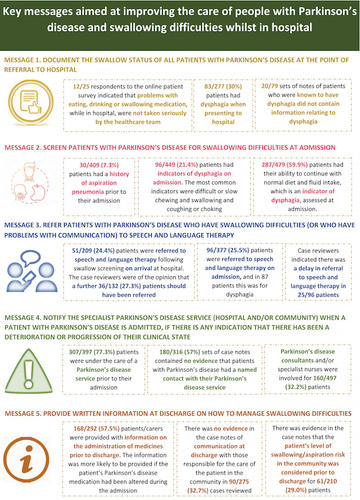Dysphagia management in Parkinson's
KnowledgeA review on the quality of dysphagia care in Parkinson's has been published by the National Confidential Enquiry into Patient Outcome and Death (NCEPOD) and the Healthcare Quality Improvement Partnership (HQIP).
'Hard to Swallow?' reviewed dysphagia care provided to adults (over 16 years of age) with Parkinson’s who were admitted to hospital when acutely unwell. The review aimed to examine the pathway of care for these patients and to explore multidisciplinary care and organisational factors in the process of identifying, screening, assessing, treating and monitoring their ability to swallow.
Dysphagia is a common non-motor symptom of later stage Parkinson's disease, and can serve as a red flag for a differential diagnosis if apparent in earlier stages.
The review outlined 5 key messages to health and care practitioners and agencies in order to improve outcomes for people with Parkinson's in acute settings (fig 1). These messages were agreed as the primary focus for action, based on the report findings and recommendations.
Figure 1: 5 key messages aimed at improving the care of people with Parkinson's and swallowing difficulties when in hospital, taken from p7 of the report

Outside of an acute setting, the management of dysphagia is also of utmost importance. Dysphagia can have a significant impact on quality of life and an individual's safety and is one of the non-motor symptoms covered in the Parkinson's Tailored Management course aimed at Parkinson's and neurology specialist nurses.
Louise Ebenezer, Parkinson's nurse specialist and co-developer of the Parkinson's Tailored Management course at Parkinson's Academy, shares that:
Louise Ebenezer
Clinical nurse specialist for Parkinson’s disease, Cwm Taf Morgannwg University Health Board
Anyone with Parkinson's experiencing changes in their taste and smell, difficulty chewing or swallowing, or weight loss should be referred to Speech and Language immediately for assessment and management.
Specialist nurses can provide essential support to the individual and the wider family around implementing these strategies, and helping with understanding around the interactions between dysphagia and other non-motor symptoms such as sialorrhea (drooling) and bradykinesia, and how to maximise medication use to align 'on' times with mealtimes.
More information
'Hard to Swallow' (2021), can be found online.
Relevant content on managing dysphagia is in the Parkinson's Tailored Management course, module 2: Non-motor symptoms, session 4: autonomic (part 2).
Related articles
'The things you can't get from the books'
Parkinson's Academy, our original and longest running Academy, houses 23 years of inspirational projects, resources, and evidence for improving outcomes for people with Parkinson's. The Academy has a truly collegiate feel and prides itself on delivering 'the things you can't get from books' - a practical learning model which inspires all Neurology Academy courses.



